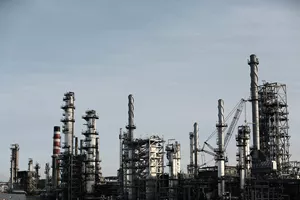Procedure for LNG Export Now Regulated
The Secretariat of Energy has approved the procedure for exporting liquefied natural gas.

Resolution 145/2025 of the Secretariat of Energy (SE), published in the Official Gazette on April 4, 2025, established the procedure applicable to requests and authorizations for exporting Liquefied Natural Gas (LNG). The Resolution was issued within the framework of the new article 3 bis of the Gas Law 24076, which establishes the export of LNG, and which was one of the main amendments to the gas regulatory framework implemented by the Bases Law 27742. Decree 1057/2024, which regulated the amendments the Bases Law introduced, delegated this regulation to the SE. For more information regarding the amendments to the Gas Law introduced by the Bases Law and its regulation, see our articles "Amendments in the Energy Sector" and " Bases Law: Amendments to the Gas Law Now Regulated."
Those that produce, process, refine, commercialize, store, and/or fractionate hydrocarbons and/or their derivatives may request authorization. The main aspects of the procedure for requesting and obtaining authorization for LNG export include:
- LNG Export Notice
Applicants seeking authorization must submit the LNG export notice to the Undersecretariat of Liquid Fuels (ULF), within the SE, demonstrating the fulfillment of the following requirements:
- Availability of natural gas to meet the volumes and conditions of the LNG export for at least five years as of its evidence. Applicants must demonstrate that they have their own projected availability supported by investment plans, or in firm volumes agreed with other producers with proven, possible, and/or probable reserves. This information must be certified by external auditors.
- Maximum quantities of LNG to be exported annually, monthly, and daily.
- Proof that they have submitted the application process for adhering to the Incentive Regime for Large Investments (Régimen de Incentivo a las Grandes Inversiones or RIGI), if applicable.
- Technical consistency of the project, which must include the facilities (existing or to be built) for transportation, liquefaction, storage, and export, the location, and the financing, except if this information has already been submitted during the RIGI adherence process.
The ULF may, with grounds, request clarifications and additional information from applicants, who may make supplementary submissions.
- Grounds for the SE’s Objections
The SE will have 120 administrative business days (as of the date the Notice is submitted) to issue objections. These may be total or partial and can only be based on the following grounds:
- Insufficiency of natural gas at national level resulting from the declaration of availability of gas resources (recently issued by SE Resolution 157/2025, and which will be updated according to the guidelines provided in Decree 1057/2024) -for more information, see our article Statement of Availability of Gas Resources Approved-.
- Inaccuracy or lack of veracity of the information and/or documentation applicants submitted in support of the export transaction.
- Existence of anti-competitive practices, including dumping concerning the domestic market under the same conditions.
- Issuance of LNG Free Export Authorization
Once the 120 administrative business days have elapsed without objections, or before the expiration of that term if the SE considers that the notified export is not subject to objections, the SE will issue the "LNG Free Export Authorization" certificate in favor of the applicant. The authorization will specify the term of the export, the volumes of LNG to be exported, and the regularity of the obligation to evidence the availability of natural gas.
- Stability of LNG Export
Once issued, LNG exports cannot be reviewed and will be firm regarding the total and annual, monthly, or daily maximum volumes (according to the terms and conditions of the authorization) for 30 years as of the starting of operations at the liquefaction plant (onshore or floating) or its expansions or subsequent stages.
The Resolution provides that amendments or repeals of the LNG export regimes, gas supply, natural gas or LNG transportation, or their corresponding processing or storage will not affect the previously granted authorization, except when the amendments are more favorable to the holders.
- Obligations of the exporter under the authorization
Once the authorization is granted, and at least 90 calendar days before the date the export starts, exporters must submit before the UFL:
-
- the sworn statement of the volumes and prices of LNG to be exported,
- the registration certificate in force within the category of storage operator before the Natural Gas Storage Registry,
- the authorization of the facility before the Natural Gas Storage Registry,
- proof of authorization by the customs registration system.
The Resolution also establishes the following periodic obligations for exporters:
- Maintaining the validity of the projected gas availability, for which—at least six months before the expiration of each certification—they must provide proof of the required availability for the next five years since the expiration date of the preceding evidence. In authorizations that involve the execution of necessary infrastructure for export, the UFL may require evidence for longer periods.
- Informing modifications of gas availability and substantial changes in the information that led to the export.
- Authorization revocation
The Resolution establishes the following grounds to revoke the authorization:
- failure to comply with the obligations to maintain the validity of the projected natural gas availability,
- failure to comply with information duties,
- material and significant default with the terms and conditions of the authorization.
Before deciding to revoke the authorization, the UFL will send a notice to the holder to cure the default or file their defense within 10 administrative business days.
- Authorization assignment
The authorization holder may assign it entirely or partially, with the enforcement authority’s prior consent, for which purposes the assignment agreement must be submitted.
This insight is a brief comment on legal news in Argentina; it does not purport to be an exhaustive analysis or to provide legal advice.